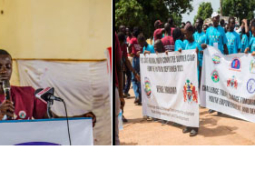
Access to employment in The Gambia is a challenge to many; young people are the hardest hit.
This is attributed largely to low skills in job absorbing sectors such as IT, electrical engineering or plumbing but also the low experience these young people have to enter the job market.
Even though it may seem like a challenge, first-time job seekers should not feel disheartened because most companies these days also take volunteering into consideration.
Most young job seekers in the Gambia have no clue about the job markets that interest them and very few do research about this.
A job seeker should not be too ambitious with their first salary.
It is common for young job seekers in the country to find the process of transitioning into the ‘real world’ a difficult one, but this feeling of uncertainty can be overcome if one is fully prepared.
The expectations at work are not always what they perceive.
In The Gambia, there are not many platforms where young people can have safe access to job information.
This platform has gathered a large user rate especially in the urban areas, but access to internet in rural areas reduces access to job information. Beside, many job providers still consider advertise vacancies in the newspaper which have little penetration rate among young people.
It is often said resume is the first contact between candidate and employers.
In the case of Gambian youth, many don’t invest time to make a good CV as a result; their CVs are often poorly presented to the employer.
Young graduates should keep in touch with their lecturers and course supervisors as this is important when it comes to providing a reliable referee to potential employer.
Also they should use social media platforms such as LinkedIn to allow employers to search for potential candidates as well as social meets – locally after 5, organised by Young Entrepreneurs Association and other similar networks.
Even though most young Gambians are active on social media such as Facebook, Twitter and Whatsapp, many utilize it only to chat and socialize and thereby reduce their professional social media presence.
This had made it difficult for employers to research about their potential candidates for hire.
It is therefore important that young people have social media accounts; they should share their professional information moderately ensuring that most essential information such as awards and other forms of recognition are included.
Gambians
Read Other Articles In Youth Forum

There is a lot happening in the youth sector - Youth and Sports Minister Badjie
Sep 2, 2025, 10:39 AM




